Ford Mustang (1999-2004) Service Manual: System Air Flow Description
MAX A/C
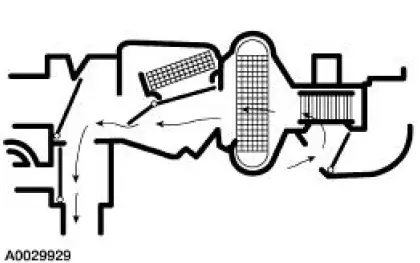
When MAX A/C is selected:
- The air inlet door vacuum control motor is at full vacuum, closing off outside air and admitting only recirculated air.
- The panel/defrost door vacuum control motor is at full vacuum and the panel/floor door vacuum control motor is at no vacuum, directing airflow to the instrument panel A/C registers. A small amount of airflow from the side window demisters will be present.
- Blended air temperature is available.
- The A/C compressor will operate if the outside temperature is above approximately 6C (43F).
- The blower motor is on.
NORM A/C
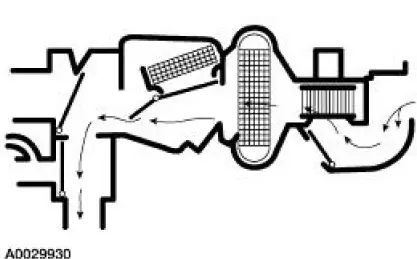
When NORM A/C is selected:
- The air inlet door vacuum control motor is at no vacuum, admitting only outside air into the passenger compartment.
- The panel/defrost door vacuum control motor is at full vacuum and the panel/floor door vacuum control motor is at no vacuum, directing airflow to the instrument panel A/C registers. A small amount of airflow from the side window demisters will be present.
- Blended air temperature is available.
- The A/C compressor will operate if the outside air temperature is above approximately 6C (43 F).
- The blower motor is on.
PANEL
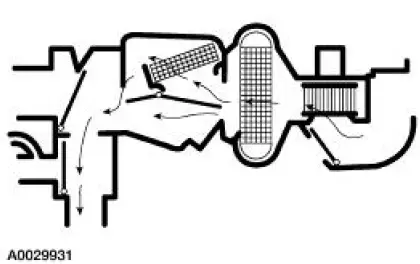
When PANEL is selected:
- The air inlet door vacuum control motor is at no vacuum, admitting only outside air into the passenger compartment.
- The panel/defrost door vacuum control motor is at full vacuum and the panel/floor door vacuum control motor is at no vacuum, directing airflow to the instrument panel A/C registers. A small amount of airflow from the side window demisters will be present.
- The temperature can be adjusted to heat the air, but the air cannot be cooled below the outside temperature.
- The A/C compressor will not operate.
- The blower motor is on.
OFF
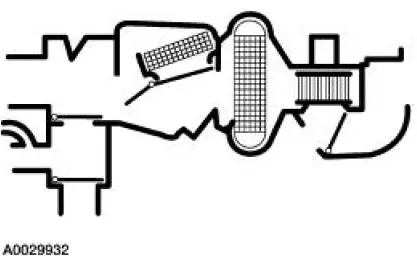
When OFF is selected:
- The air inlet door vacuum control motor is at full vacuum, closing off outside air from entering the passenger compartment.
- The panel/floor door vacuum control motor is at full vacuum and the panel/defrost door vacuum control motor is at no vacuum, closing off airflow to the defrost duct, side window demisters, floor duct and instrument panel A/C registers.
- The A/C compressor will not operate.
- The blower motor is off.
FLOOR
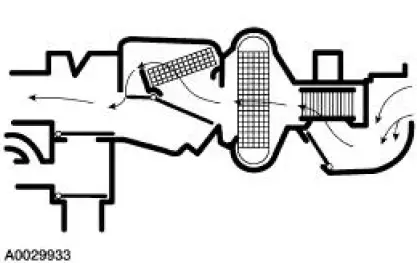
When FLOOR is selected:
- The air inlet door vacuum control motor is at no vacuum, admitting only outside air into the passenger compartment.
- The panel/floor door vacuum control motor is at full vacuum and the panel/defrost door vacuum control motor is at no vacuum, directing airflow to the floor duct. A small amount of airflow from the side window demisters will be present.
- The temperature can be adjusted to heat the air, but the air cannot be cooled below the outside temperature.
- The A/C compressor will not operate.
- The blower motor is on.
FLOOR/DEFROST
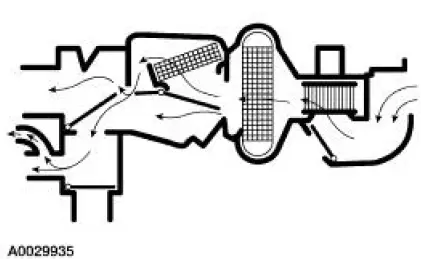
When FLOOR/DEFROST is selected:
- The air inlet door vacuum control motor is at no vacuum, admitting only outside air into the passenger compartment.
- The panel/floor door vacuum control motor is at partial vacuum and the panel/defrost door vacuum control motor is at no vacuum, directing airflow to the floor duct, the defroster duct, and the side window demisters.
- The temperature can be adjusted to heat or cool the air below the outside temperature.
- The A/C compressor will operate if the outside air temperature is above approximately 6C (43 F).
- The blower motor is on.
DEFROST
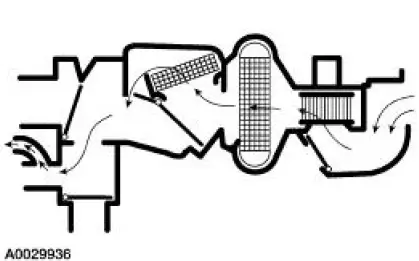
When DEFROST is selected:
- The air inlet door vacuum control motor is at no vacuum, admitting only outside air into the passenger compartment.
- The panel/floor door and panel/defrost door vacuum control motors are at no vacuum, directing airflow to the defroster duct and the side window demisters.
- The temperature can be adjusted to heat or cool the air below the outside temperature.
- The A/C compressor will operate if the outside air temperature is above approximately 6C (43 F).
- The blower motor is on.
Electrical Components
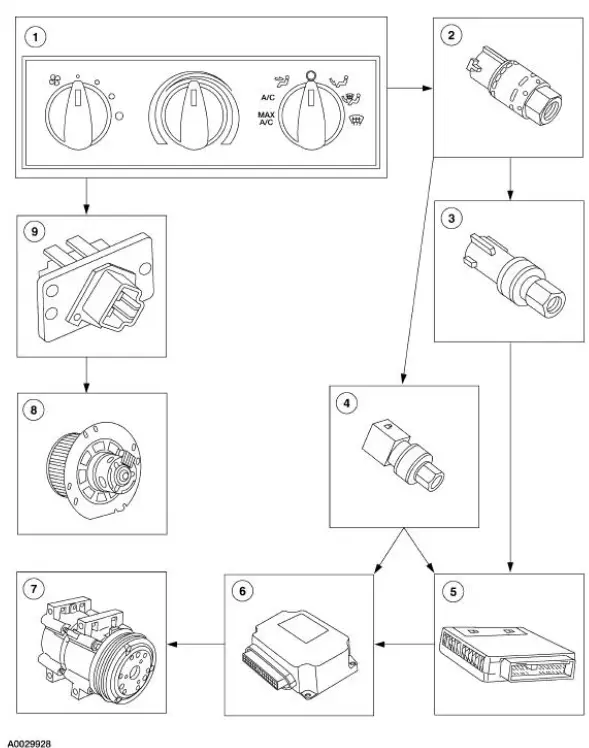
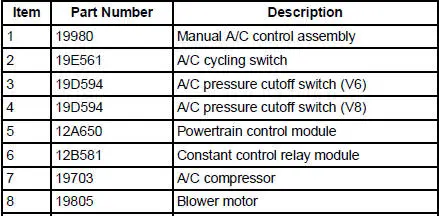

 Principles of Operation
Principles of Operation
There are four main principles involved with the basic theory of
operation:
heat transfer
latent heat of vaporization
relative humidity
effects of pressure
Heat Transfer
If two substan ...
 Climate Control System (Diagnosis and Testing)
Climate Control System (Diagnosis and Testing)
Refer to Wiring Diagrams Cell 54 , Air Conditioner/Heater for schematic
and connector information.
Special Tool(s)
Connector, Refrigerant
Pressure Line
412-093 (T94P-19623-E)
...
Other materials:
Pinpoint Test O: DTC B1870 - Air Bag Indicator Shorted to Battery
Normal Operation
The air bag indicator is designed to illuminate for 6 (+/-2) seconds
when the ignition switch is turned to
the RUN position. This initial 6 seconds of illumination is considered
normal operation and is called
proveout of the air ba ...
Headlamps
Refer to Wiring Diagrams Cell 85 , Headlamps for schematic and
connector information.
Special Tool(s)
73III Automotive Meter or
equivalent
105-R0057
Inspection and Verification
1. Verify the customer concern by operating the headlamps. ...
Running out of fuel
Avoid running out of fuel because this situation may have an adverse
effect on powertrain components.
If you have run out of fuel:
• You may need to cycle the ignition from off to on several times after
refueling to allow the fuel system to pump the fuel fr ...
